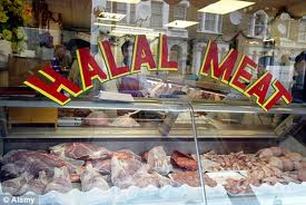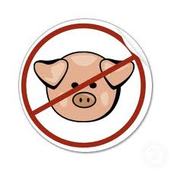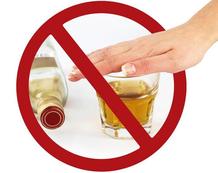The Prophet (SAW) never expressed disapproval of food; if he desired it, he ate it, and if he disliked it, he left it alone. |
Islamic Dietary Restrictions

Copyright: Alamy
If you are a new Muslim, you have entered a world which you might not have ever had any experience with before in the realm of food: avoidance. Truly there really aren't many food restrictions in Islam; some other religions have far tighter parameters in comparison. The food world in the West is in its infancy in recognizing consumer food selectiveness, especially with increasing food sensitivities and allergies and those who embrace food selectiveness as a lifestyle choice. However, I have found that despite a more knowledgeable and "picky" consumer base in the current culture, food companies still haven't caught up on what Muslims want (and don't want) in their foods Here's a quick schooling on what you need to know about your dietary choices.
Halal Meat
Halal Meat
|
As a general rule of thumb, Muslims obtain their meat from places which perform the slaughtering of their meat in a manner in accordance with Islamic law. This entails the use of a sharp knife to make a swift, clean cut of the throat, causing the animal to lose consciousness as quickly as possible and inflicting the least amount of pain on the animal so as to be humane. Also at the moment of sacrifice, the name of Allah (SWT) is mentioned. The blood is then drained. We refer to the meat obtained by using these methods as "halal" (ha-LEL).
|
|
So what should one do if a halal meat source is unavailable to you? Don't worry... Alhumdulillah, Allah (SWT) has permitted us to eat the meat from the People of the Book (Christians and Jews). As per the hadith in Sahih al-Bukhari, Aisha (RA) reported that some people said to the Prophet (SAW) that people came to them with meat which they do not know whether they have mentioned the name of Allah upon it or not. The Prophet (SAW) replied, "Mention the name of Allah upon it and eat it.” In other words, simply say "Bismillah" before you eat from it. Additionally, thanks to the convenience of the internet, it is possible according to one's means, to special order halal meat by mail. See Web Links for some providers.
Pork

Muslims refrain from eating pork in adherence with the Qur'an which states:
"He has only forbidden you what dies of itself, and blood, and flesh of swine, and that over which any other (name) than (that of) Allah has been invoked; but whoever is driven to necessity, not desiring, nor exceeding the limit, no sin shall be upon him; surely Allah is Forgiving, Merciful," Qur'an, surat al-Baqarah 2:173. Qur'an 16:115 states something quite similar.
As mentioned elsewhere on this website, the Qur'an reinstates original messages given to previous prophets and noted in the other books of Allah (SWT)(the Bible/Gospels/Ingeel, the Torah/Tawrah); but given the alterations of those books, we refer to the Qur'an as our reaffirmed guide. Sometimes there is a preservation of the original ruling; notably a similar prohibition pertaining to the consumption of pork is also found in the Bible in Deuteronomy 14:8 which states:
"The pig also [forbidden] because it is a splitter of the hoof but there is no cud. It is unclean for you. None of their flesh must you eat and carcass you must not touch." Follow this link for a very interesting short video of a well-known Christian preacher elaborating on this biblical ruling.
Modern advances in the sciences and in medical research confirm that the pig is known to be a carrier of germs which would be harmful to humans. It is a well-known characteristic of pigs that they have no standard in what they will and not eat: literally anything goes! Most English speakers are very familiar with the phrase, "You are what you eat." It is true, that what one consumes in fact becomes a part of one's body literally, and nourishes it with necessary nutrients and energy. Allah Most-High granted allowances and placed restrictions on mankind for a reason, and it is widely accepted that these facts mentioned here are the reason behind the restriction on pork consumption, which would deny the preservation of life and health for humans. Source
Pork can come in many forms. It is good practice to check the ingredients in all of the processed foods that you purchase. Most all sausages and many cured meats include pork. Lard is derived from swine, and is commonly, although decreasingly, used as a fat source for a variety of ethnic foods. Also, one thing you might not be aware of is that gelatin, which is derived from the collagen inside animals' skin and bones, can be found in many food products. In most cases it is from a porcine (pork) source. I recommend checking the ingredients in all processed foods you buy, but from experience, I would give special attention to the following products:
There are various sources of gelatin other than pork such as bovine (sourced from cows) or fish, so to be sure if a product meets Islamic standards, contact the manufacturer to inquire about the source. Kosher labeling DOES NOT MEAN IT IS HALAL, as (1.) the Jewish laws for "kosher" do not consider the inclusion of alcohol (they permit themselves alcohol) and (2.) Jewish scholars might make a ruling that an item is "Kosher", yet Islamic scholars would not parallel that ruling. See additional resource remarking on kosher vs. halal.
"He has only forbidden you what dies of itself, and blood, and flesh of swine, and that over which any other (name) than (that of) Allah has been invoked; but whoever is driven to necessity, not desiring, nor exceeding the limit, no sin shall be upon him; surely Allah is Forgiving, Merciful," Qur'an, surat al-Baqarah 2:173. Qur'an 16:115 states something quite similar.
As mentioned elsewhere on this website, the Qur'an reinstates original messages given to previous prophets and noted in the other books of Allah (SWT)(the Bible/Gospels/Ingeel, the Torah/Tawrah); but given the alterations of those books, we refer to the Qur'an as our reaffirmed guide. Sometimes there is a preservation of the original ruling; notably a similar prohibition pertaining to the consumption of pork is also found in the Bible in Deuteronomy 14:8 which states:
"The pig also [forbidden] because it is a splitter of the hoof but there is no cud. It is unclean for you. None of their flesh must you eat and carcass you must not touch." Follow this link for a very interesting short video of a well-known Christian preacher elaborating on this biblical ruling.
Modern advances in the sciences and in medical research confirm that the pig is known to be a carrier of germs which would be harmful to humans. It is a well-known characteristic of pigs that they have no standard in what they will and not eat: literally anything goes! Most English speakers are very familiar with the phrase, "You are what you eat." It is true, that what one consumes in fact becomes a part of one's body literally, and nourishes it with necessary nutrients and energy. Allah Most-High granted allowances and placed restrictions on mankind for a reason, and it is widely accepted that these facts mentioned here are the reason behind the restriction on pork consumption, which would deny the preservation of life and health for humans. Source
Pork can come in many forms. It is good practice to check the ingredients in all of the processed foods that you purchase. Most all sausages and many cured meats include pork. Lard is derived from swine, and is commonly, although decreasingly, used as a fat source for a variety of ethnic foods. Also, one thing you might not be aware of is that gelatin, which is derived from the collagen inside animals' skin and bones, can be found in many food products. In most cases it is from a porcine (pork) source. I recommend checking the ingredients in all processed foods you buy, but from experience, I would give special attention to the following products:
- marshmallows
- Jell-o gelatin products
- various candies (you would be surprised how many of them contain gelatin!)
- "fruit" snacks (those little gummies sold in prepackaged snack packs)
- foods with a sugary coating (some cereals, toaster pastries, etc)
- sour cream
- yogurt
- ice cream (also check them for vanilla extract; should be avoided too)
- cheeses (the source of the ingredient "enzymes")
- vitamins and gelcaps
- Jiffy muffin mix
Alcohol

Consumption of alcohol is strictly forbidden as found in the following verses in Qur’an:
“O ye who believe! Intoxicants and gambling, (dedication of) stones, and (divination by) arrows, are an abomination, of Satan's handwork: eschew such (abomination), that ye may prosper. Satan's plan is (but) to excite enmity and hatred between you, with intoxicants and gambling, and hinder you from the remembrance of God, and from prayer: will ye not then abstain? Obey God, and obey the Apostle, and beware (of evil): if ye do turn back, know ye that it is Our Apostle's duty to proclaim (the message) in the clearest manner,” Qur'an 5:90-92
A relevant Hadith to look at in the case of alcohol is the following reported by Anas that “The Messenger of Allah (SAW) cursed ten persons in case of wine: one who extracted the juice, who demanded its extraction, who drank it, who carried it, to whom it was carried, who served it, who sold it, who used its income, and its seller and buyer,”(Tirmizi).
Accordingly, this entails elimination of all alcoholic beverages from one's diet, but also there are many other food items containing alcohol that one should be vigilant to check for when selecting foods. Perhaps surprisingly, many baked items such as cookies and cakes have the ingredient vanilla extract, which contains alcohol (as do all other baking "extracts"). And, yes, although this is a very small amount and "experts" say that any alcohol dissipates during the baking/cooking process, in these cases such food is not considered halal and one must take care before consuming them. If you use vanilla extract yourself in baking, you can instead use vanilla powder (you can usually find this in "Arabic" markets). When purchasing baked products, it is best to be aware of this and to strive to please Allah (SWT) in being attentive to avoid prohibitions. Red & white wine vinegars would also qualify as forbidden: take care when eating out in restaurants in light of this. Additionally, some medicines such as liquid cold medicines contain alcohol.
May Allah SWT make it easy for the Muslims to avoid consuming anything which would be displeasing to Him. Ameen!
See more Practices of Muslims
“O ye who believe! Intoxicants and gambling, (dedication of) stones, and (divination by) arrows, are an abomination, of Satan's handwork: eschew such (abomination), that ye may prosper. Satan's plan is (but) to excite enmity and hatred between you, with intoxicants and gambling, and hinder you from the remembrance of God, and from prayer: will ye not then abstain? Obey God, and obey the Apostle, and beware (of evil): if ye do turn back, know ye that it is Our Apostle's duty to proclaim (the message) in the clearest manner,” Qur'an 5:90-92
A relevant Hadith to look at in the case of alcohol is the following reported by Anas that “The Messenger of Allah (SAW) cursed ten persons in case of wine: one who extracted the juice, who demanded its extraction, who drank it, who carried it, to whom it was carried, who served it, who sold it, who used its income, and its seller and buyer,”(Tirmizi).
Accordingly, this entails elimination of all alcoholic beverages from one's diet, but also there are many other food items containing alcohol that one should be vigilant to check for when selecting foods. Perhaps surprisingly, many baked items such as cookies and cakes have the ingredient vanilla extract, which contains alcohol (as do all other baking "extracts"). And, yes, although this is a very small amount and "experts" say that any alcohol dissipates during the baking/cooking process, in these cases such food is not considered halal and one must take care before consuming them. If you use vanilla extract yourself in baking, you can instead use vanilla powder (you can usually find this in "Arabic" markets). When purchasing baked products, it is best to be aware of this and to strive to please Allah (SWT) in being attentive to avoid prohibitions. Red & white wine vinegars would also qualify as forbidden: take care when eating out in restaurants in light of this. Additionally, some medicines such as liquid cold medicines contain alcohol.
May Allah SWT make it easy for the Muslims to avoid consuming anything which would be displeasing to Him. Ameen!
See more Practices of Muslims
